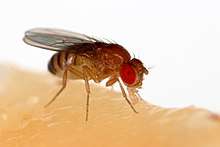Anuranjan Anand
| Anuranjan Anand | |
|---|---|
| Born |
5 April 1965 India |
| Residence | Bengaluru, Karnatak, India |
| Nationality | Indian |
| Alma mater | |
| Known for | Studies on human genetic disorders |
| Awards |
|
| Scientific career | |
| Fields | |
| Institutions |
|
| Doctoral advisor |
|
Anuranjan Anand (born 5 April 1965) is an Indian geneticist and the chair professor at the Molecular Biology and Genetics Unit of the Jawaharlal Nehru Centre for Advanced Scientific Research. Known for his studies on the human genetic disorders, Anand is an elected fellow of all the three major Indian science academies namely the Indian Academy of Sciences, the Indian National Science Academy and the National Academy of Sciences, India. The Department of Biotechnology of the Government of India awarded him the National Bioscience Award for Career Development, one of the highest Indian science awards, for his contributions to biosciences in 2008.
Biography
Born on 5 April 1965, Anuranjan Anand did his doctoral studies at the Indian Institute of Science.[1] Subsequently, he moved to the US for his post-doctoral studies at the laboratory of Julie Baker of Stanford University.[2] On his return to India, he joined the Jawaharlal Nehru Centre for Advanced Scientific Research (JNCASR) as a member of faculty at the Molecular Biology and Genetics Unit (MBGU)[3][4] and later became the chair professor of the Unit, a position he holds to date.[5] When the institute established the Neuroscience Unit (NSU) in 2014, he was designated as its associate faculty.[6] He also serves as an adjunct faculty at the Centre for Human Genetics, an institution funded by the Government of Karnataka for promoting education and research in the field of human genetic disorders.[7]
Anand resides in Hebbal, a suburb of Bengaluru, Karnataka.[8]
Legacy

During his post doctoral days at Stanford, Anand worked with his colleagues at the Baker's Lab on the genetic mutations of fruitless gene, a gene found in Drosophila melanogaster and their studies are reported to have widened the understanding of the gene behavior.[2] Back in India, his main focus was on the study of human genetic disorders with special emphasis on several variants of epilepsy such as idiopathic generalized epilepsy, juvenile myoclonic epilepsy, reflex epilepsy, hot water epilepsy and refractory epilepsy as well as sensorineural disorders.[9] It was during these studies, he investigated the EIG8 and HWE3 genes and discovered the genetic loci causing epilepsy and sensorineural hearing loss.[10][11] His studies have been documented by way of a number of articles[12][13][note 1] and ResearchGate, an online repository of scientific articles has listed 98 of them.[14]
Anand is a member of the Research Area Panel of the National Institute of Immunology[15] and sits in the Ethics Committee of the Parkinson's and Ageing Research Foundation, an agency which promotes and funds advanced research on the conditions.[16] He was the convener of the organizing committee of the 42nd Annual Meeting of the Indian Society of Human Genetics (ISHG2017) held in March 2017 in Bengaluru[17] and has delivered keynote or invited addresses at many international conferences.[18]
Awards and honors
The Department of Biotechnology of the Government of India awarded him the National Bioscience Award for Career Development, one of the highest Indian science awards in 2008.[19] The Indian Academy of Sciences elected him as a fellow in 2011.[20] He received the elected fellowship of the other two major Indian science academies, the National Academy of Sciences, India and the Indian National Science Academy in 2013[21] and 2016 respectively.[22]
Selected bibliography
- Ratnapriya, Rinki; Satishchandra, Parthasarthy; Dilip, S.; Gadre, Girish; Anand, Anuranjan (2009-11-01). "Familial autosomal dominant reflex epilepsy triggered by hot water maps to 4q24-q28". Human Genetics. 126 (5): 677–683. doi:10.1007/s00439-009-0718-6. ISSN 0340-6717.
- Chatterjee, Arunima; Jalvi, Rajeev; Pandey, Nishtha; Rangasayee, R.; Anand, Anuranjan (2009-01-01). "A novel locus DFNA59 for autosomal dominant nonsyndromic hearing loss maps at chromosome 11p14.2–q12.3". Human Genetics. 124 (6): 669–675. doi:10.1007/s00439-008-0596-3. ISSN 0340-6717.
- Kapoor, Ashish; Ratnapriya, R.; Kuruttukulam, Gigy; Anand, Anuranjan (2007-07-01). "A novel genetic locus for juvenile myoclonic epilepsy at chromosome 5q12–q14". Human Genetics. 121 (6): 655–662. doi:10.1007/s00439-007-0360-0. ISSN 0340-6717.
See also
Notes
- ↑ Please see Selected bibliography section
References
- ↑ "Fellow profile". Indian Academy of Sciences. 2018-01-12. Retrieved 2018-01-12.
- 1 2 "Background: The science behind the gene for sexual behavior (12/96)". web.stanford.edu. Retrieved 2018-01-12.
- ↑ "Faculty fellow". JNCASR. 2018-01-12. Retrieved 2018-01-12.
- ↑ Handbook of Universities. Atlantic Publishers & Dist. 2006. pp. 418–. ISBN 978-81-269-0607-9.
- ↑ "Chair professor". www.jncasr.ac.in. 2018-01-12. Retrieved 2018-01-12.
- ↑ "Neuroscience Unit". www.jncasr.ac.in. Retrieved 2018-01-12.
- ↑ "Centre for Human Genetics". www.chg.res.in. 2018-01-12. Retrieved 2018-01-12.
- ↑ "NASI fellows". National Academy of Sciences, India. 2018-01-12. Retrieved 2018-01-12.
- ↑ "Anuranjan Anand - Home". www.jncasr.ac.in. Retrieved 2018-01-12.
- ↑ "INSA :: Indian Fellows Elected". insaindia.res.in. Retrieved 2018-01-12.
- ↑ "Indian mutation behind hearing loss". Nature India. doi:10.1038/nindia.2009.91. Retrieved 2018-01-14.
- ↑ "Browse by Fellow". Indian Academy of Sciences. 2018-01-14. Retrieved 2018-01-14.
- ↑ "Publications Authored by Anuranjan Anand - PubFacts.com". www.pubfacts.com. 2018-01-12. Retrieved 2018-01-12.
- ↑ "On ResearchGate". On ResearchGate. 2018-01-09. Retrieved 2018-01-09.
- ↑ "Research Area Panel - NII". www.nii.res.in. 2018-01-12. Retrieved 2018-01-12.
- ↑ "Parkinson's and Ageing Research Foundation" (PDF). Clinical Trial Registry of India. 2018-01-12. Retrieved 2018-01-12.
- ↑ "MRDG IISC Conference". www.mrdg.iisc.ernet.in. Retrieved 2018-01-14.
- ↑ "IJMR April 2017". www.icmr.nic.in. Retrieved 2018-01-14.
- ↑ "Awardees of National Bioscience Awards for Career Development" (PDF). Department of Biotechnology. 2016. Retrieved 2017-11-20.
- ↑ "Fellowship - Indian Academy of Sciences". www.ias.ac.in. 2017-12-28. Retrieved 2017-12-28.
- ↑ "NASI Year Book 2015" (PDF). National Academy of Sciences, India. 2018-01-12. Retrieved 2018-01-12.
- ↑ "Indian fellow". Indian National Science Academy. 2018-01-12. Retrieved 2018-01-12.
External links
- "Adjunct Faculty - Centre for Human Genetics". www.chg.res.in. 2018-01-12. Retrieved 2018-01-12.